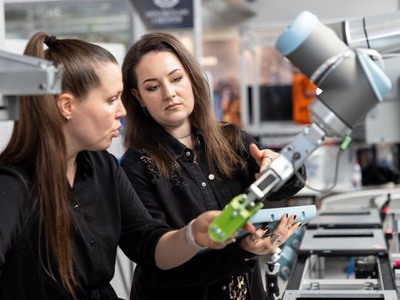Despite the fact that diversity strengthens both innovation and the working environment, women remain underrepresented in the manufacturing industry. A new research project at the University of Skövde is investigating how digital transformation can be a key to enhanced gender equality.
 Miranda Kedbäck with a collaborative robot at ASSAR Industrial Innovation Arena.
Miranda Kedbäck with a collaborative robot at ASSAR Industrial Innovation Arena.
With AI, IoT, and robotics, the manufacturing industry is becoming more autonomous, with machines predicting faults, adjusting production in real-time, and collaborating without human intervention. However, as digitalisation sweeps through the industry, an old pattern risks remaining unchanged – its male dominance. Globally, women make up only 20–25 per cent of the workforce in the manufacturing industry, and the proportion in leadership positions is even lower.
Diversity Strengthens Competitiveness
"If we are to build a sustainable industry for the future, we need to utilise the skills of the entire population. Diversity and gender equality are not just about fairness – they also impact the pace of innovation and a company’s competitiveness," says Miranda Kedbäck, Lecturer in Production Engineering at the University of Skövde.
The project explores how digitalisation can contribute to a more inclusive work environment and highlight new pathways for women’s participation. Through company visits and analyses of workplace culture, both barriers and opportunities are mapped. The goal is to develop concrete recommendations that can inspire the industry to change.
 Miranda Kedbäck, Lecturer in Production Engineering at the University of Skövde.
Miranda Kedbäck, Lecturer in Production Engineering at the University of Skövde.
Culture and Structure Must Change
Previous research has shown that increased opportunities for remote work tend to benefit women in particular, that reducing physical barriers in industrial workplaces enhances accessibility, and that the use of AI in recruitment can reduce bias.
"We see that technologies within Industry 4.0 and 5.0 can become tools for gender equality – but only if we are aware of the risks and actively work towards inclusion. New technology alone is not enough; we must also change the culture and structures within the industry. This project is a step towards breaking old patterns and demonstrating how the industry of the future can be both more gender-equal and competitive – where women are no longer missing from the picture," says Miranda Kedbäck.
The full title of the research project is "Gender Equity in the Manufacturing Industry: Exploring the Role of Digital Transformation", and the project partners are IDC West Sweden AB and Mondragon University. The project runs until June 2025.



